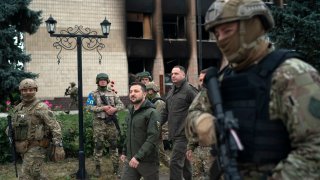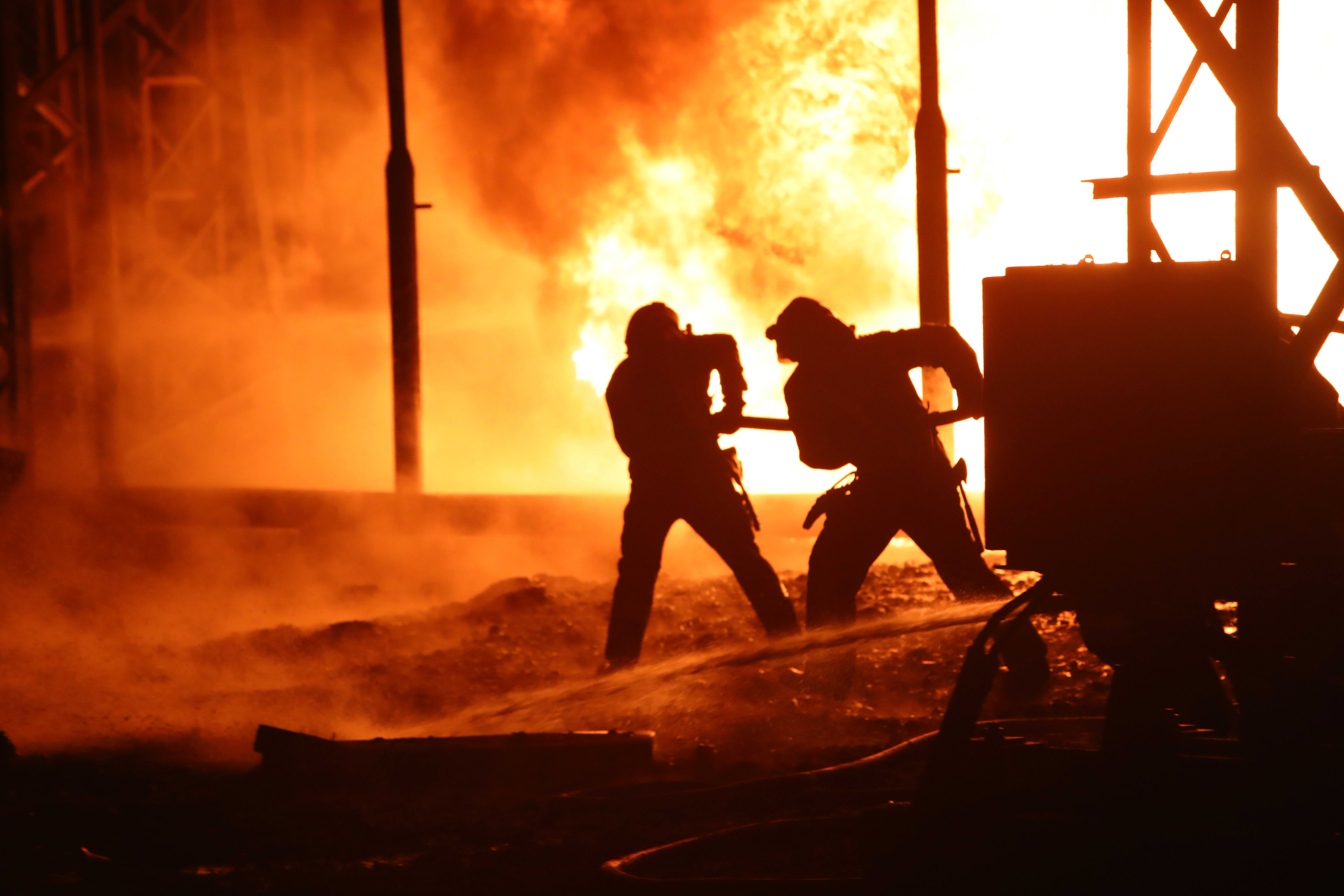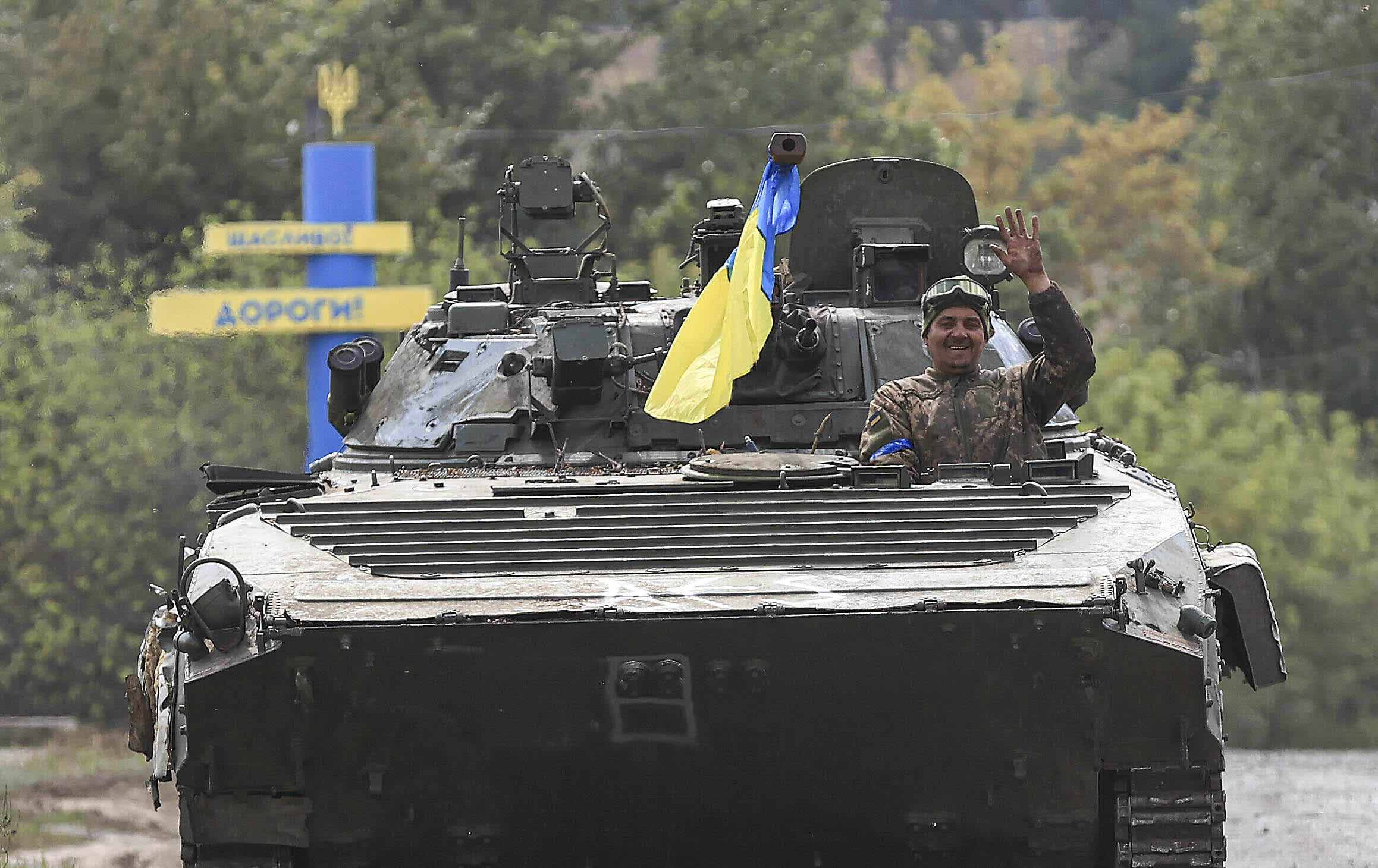
Hand on heart, Ukrainian President Volodymyr Zelenskyy watched his country’s flag rise Wednesday above the recaptured city of Izium, making a rare foray outside the capital that highlights Moscow’s embarrassing retreat from a Ukrainian counteroffensive.
Russian forces left the war-scarred city last week as Kyiv's soldiers pressed a stunning advance that has reclaimed large swaths of territory in Ukraine’s northeastern Kharkiv region.
As Zelenskyy looked on and sang the national anthem, the Ukrainian flag was raised in front of the burned-out city hall. After almost six months under Russian occupation, Izium was left largely devastated, with apartment buildings blackened by fire and pockmarked by artillery strikes.
A gaping hole and piles of rubble stood where one building had collapsed.
“The view is very shocking, but it is not shocking for me," Zelenskyy told journalists, "because we began to see the same pictures from Bucha, from the first de-occupied territories … the same destroyed buildings, killed people.”
Russia-Ukraine War Coverage:
Bucha is a small city on Kyiv's outskirts from which Russian troops withdrew in March. In the aftermath, Ukrainian authorities discovered the bodies of hundreds of civilians dumped in streets, yards and mass graves. Many bore signs of torture.
Prosecutors said they so far have found six bodies with traces of torture in recently retaken Kharkiv region villages. The head of the Kharkiv prosecutor’s office, Oleksandr Filchakov, said bodies were found in Hrakove and Zaliznyche, villages around 60 kilometers (35 miles) southeast of Kharkiv city.
“We have a terrible picture of what the occupiers did. ... Such cities as Balakliia, Izium, are standing in the same row as Bucha, Borodyanka, Irpin,” said Ukrainian Prosecutor General Andriy Kostin, listing places where the Ukrainians have alleged Russian forces committed atrocities.
Local authorities have made similar claims in other areas Russia previously held, but it was not immediately possible to verify their information. They have not yet provided evidence of potential atrocities on the scale described in Bucha, where the number and conditions of civilian casualties prompted international demands to press war crimes charges against Russian officials.
As he was returning from the front early Thursday, a passenger car collided with Zelenskyy's vehicle in a motorcade in Kyiv, but he wasn't seriously hurt, his spokesman said on Facebook. Spokesman Sergii Nikiforov said the driver of the other vehicle received first aid from Zelenskyy’s medical team and was taken by ambulance. Medics examined the president, who suffered no serious injuries in the accident, Nikiforov wrote. He did not specify what injuries Zelenskyy, 44, might have suffered.
Moscow’s recent rout in northeastern Ukraine was its largest military defeat since Russian troops withdrew from the Kyiv area months ago. On the northern outskirts of Izium, the remains of Russian tanks and vehicles lay shattered along a road.
As Zelenskyy visited, his forces pressed their counteroffensive, de-mined retaken ground and investigated possible war crimes. He said that “life comes back” as Ukrainian soldiers return to previously occupied villages.
The Ukrainian governor of the eastern Luhansk region, Serhiy Haidai, said Ukrainian soldiers were preparing to retake the area, which borders the Kharkiv region and was has been mostly under Russian control since July. Intense shelling of Ukrainian forces continued, he said.
Haidai told The Associated Press that Ukrainian troops were flying Ukrainian flags in the cities of Svatove and Starobilsk.
But in Kreminna, another city where Ukrainians raised their flag, Russians returned Wednesday and “tore down the (Ukrainian) flags and are demonstrably showing that they’re there,” Haidai said.
A Russia-allied separatist military leader confirmed the Ukrainian advance on the Luhansk region. Andrei Marochko, a local militia officer, said on Russian TV that the situation was “really difficult.”
“In some places, the contact line has come very close to the borders of the Luhansk People’s Republic,” Marochko said, referring to the independent state the separatists declared eight years ago.
The counteroffensive has left more weapons in Ukrainian hands.
Russian forces likely left behind dozens of tanks, armored personnel carriers and other heavy weaponry as they fled Ukraine’s advance in the east, a Ukrainian think tank said Wednesday. The Center for Defense Strategies said one Russian unit fleeing the Izium area left behind more than three dozen T-80 tanks and about as many infantry fighting vehicles. Another unit left 47 tanks and 27 armored vehicles, it said.
The center said Russian forces tried to destroy some of the abandoned vehicles through artillery strikes as they fell back. Typically, armed forces ruin equipment left behind so their opponent can’t use it. However, the chaos of the Russian withdrawal apparently forced them to abandon untouched ammunition and weapons.
With the recent Ukrainian gains, a new front line has emerged along the Oskil River, which largely traces the Kharkiv region's eastern edge, a Washington-based think tank, the Institute for the Study of War, said Wednesday.
“Russian troops are unlikely to be strong enough to prevent further Ukrainian advances along the entire Oskil River because they do not appear to be receiving reinforcements, and Ukrainian troops will likely be able to exploit this weakness to resume the counteroffensive across the Oskil if they choose,” the institute said.
In other areas, Russia continued its attacks, causing more casualties in a war that has dragged on for nearly seven months.
Two people were killed and three wounded after Russia attacked Mykolaiv with S-300 missiles overnight, regional governor Vitaliy Kim said.
The Nikopol area, across a river from the shutdown Zaporizhzhia Nuclear Power Plant, was shelled three times during the night, with no injuries immediately reported, regional governor Valentyn Reznichenko said.
Fighting also raged in the eastern Donetsk region, where shelling killed five civilians and wounded 16. Together, Luhansk and Donetsk make up the Donbas, an industrial area that Moscow set out to capture following an unsuccessful attempt to invade Kyiv.
Russian troops are targeting critical infrastructure. Eight cruise missiles aimed at water equipment hit Zelenskyy's hometown of Kryvyi Rih, a city on the Inhulets River 150 kms (93 miles) southwest of Dnipro, the deputy head of the president’s office, Kyrylo Tymoshenko, reported on his Telegram channel. Zelenskyy said the strikes appeared to be an attempt to flood the city and that a dam on a reservoir was hit. Video posted online showed elevated water levels on the Inhulets and flooded city streets, and evacuations of residents were suggested.
U.S. President Joe Biden observed Wednesday that Ukrainian forces have made “significant progress” in recent days but added, “I think it’s going to be a long haul.”
While criticism of the invasion seems to be increasing in Russia, German Chancellor Olaf Scholz said after a phone call with Russian President Vladimir Putin, “Unfortunately, I cannot tell you that the realization has grown over there by now that this was a mistake to start this war.”
U.N. Secretary-General Antonio Guterres said Wednesday that he had spoken with Putin about exporting Russian fertilizer through Ukraine’s Black Sea ports to address a famine threat. The U.N. chief said at a news conference in New York that high prices for fertilizer have reduced the planting of crops, making it critical to increase Russian exports of ammonia — a key fertilizer ingredient — by shipping it through Black Sea ports now used to transport grain from Ukraine.
Western military and economic support has allowed Ukraine to keep fighting since Russia invaded on Feb. 24, and the Ukrainian government received more assistance Wednesday.
An international group of creditors, including the U.S., finalized a deal to suspend Ukraine’s debt service through the end of 2023, helping the country ease liquidity pressures and increase social, health and economic spending.
Arhirova reported from Kyiv. Associated Press journalist Jon Gambrell in Kyiv contributed.



